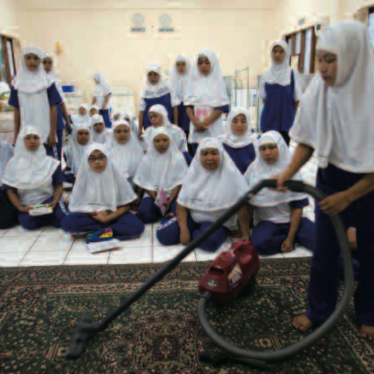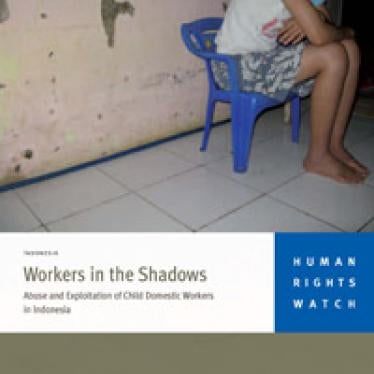(New York) - The Indonesian government should adopt stronger legal protections for domestic workers in 2010 to address longstanding patterns of labor exploitation and abuse, Human Rights Watch, Jala PRT, Rumpun Gema Perempuan, Migrant Care, and Serikat PRT Tunas Mulia said today in anticipation of Indonesia's Domestic Workers Day on February 14, 2010. Indonesian domestic workers both at home and abroad are often denied the protection of regular labor laws and endure excessively long working hours with no days off, unpaid wages, and physical or sexual abuse.
"Domestic workers work just as hard, if not harder, than many workers in the so-called formal sector," said Lita Anggraini, coordinator of Jala PRT. "It's a simple matter of equality that they are entitled to the same rights, protections, and benefits as other workers."
The Indonesian government has important opportunities to improve legal protections in 2010, the groups said. A proposed comprehensive national domestic worker law is being drafted for parliamentary consideration this year. The government also is in ongoing negotiations with Malaysia and Kuwait, where many Indonesians work, to develop Memoranda of Understanding (MOUs) on migrant domestic workers. Indonesia is planning to participate in efforts to negotiate new international standards for domestic work at the International Labour Organization (ILO).
An ILO study in 2003 found that approximately 2.6 million people were employed as domestic workers across Indonesia, including almost 700,000 children. More than a million Indonesian women and girls are employed as domestic workers in the Middle East and Asia, with large numbers in Saudi Arabia, Kuwait, Malaysia, and Singapore. Human Rights Watch has extensively documented the inadequate government response to the range of human rights abuses these workers often experience. See: "Workers in the Shadows" and "As if I Am Not Human."
In December 2009, Indonesia's Legislation Council (Baden Legislatif; BALEG) agreed to place the drafting and passage of a new national Domestic Worker Law on parliament's agenda for 2010. This law presents an opportunity to correct the discrimination in Indonesia's current labor laws, under which "formal workers" are entitled to a minimum wage, overtime pay, an eight-hour workday and 40-hour work week, a weekly day of rest, and vacation, but domestic workers are not. The current exclusion of all domestic workers from basic labor protections has a discriminatory impact on women and girls, who constitute the vast majority of domestic workers, the groups said. The new legislation should also ensure adequate protections for the hundreds of thousands of children, ages 15 to 17, who are domestic workers.
"Some employers choose to hire a girl rather than an adult because they want someone who will work for less money and who will be easier to boss around," said Bede Sheppard, Asia researcher in the children's rights division at Human Rights Watch. "Since these same factors, in combination with isolation in private homes, make a worker more vulnerable to abuse and exploitation, these girls need extra protections."
These protections should include guarantees of decent food and housing, and time for additional schooling or vocational training, Human Rights Watch said.
The new law should also ensure strict enforcement of the minimum age of 15 for employment for domestic work, the groups said. It should require employers and labor agents who recruit and place domestic workers to verify the age of prospective domestic workers by reviewing and maintaining copies of the employees' birth certificates or junior high school graduation certificates.
In June 2009, Indonesia suspended new migration of domestic workers to Malaysia in response to a series of high-profile abuse cases and poor government response. Following similar reports in September 2009, Indonesia also halted migration for domestic work to Kuwait. Indonesia is now negotiating MOUs with both countries on migrant domestic workers to improve protections before lifting the moratorium.
The negotiations with Malaysia are in the final stages, and the MOU is expected to include the right to one day off a week and the right for domestic workers to retain their passports, allowing them freedom to leave their positions if they choose. A minimum wage is still being discussed.
"The agreed-on protections are an important step forward, but not nearly enough to prevent the abuse and exploitation Indonesian women face while working abroad," said Anis Hidayah, the executive director of Migrant Care. "Any new MOU should address other key labor protections such as overtime pay, the right to form associations, and limits to working hours and recruitment fees. It should also establish clear penalties and enforcement mechanisms."
These negotiations also provide a forum to coordinate regulation and oversight over the transnational recruitment process, as well as prosecution of abusers across national borders. Currently, Indonesian domestic workers in Malaysia typically forego their first six months of pay to repay recruitment fees, and many who suffer abuse often are repatriated before having a chance to report abuse.
In June 2010, Indonesia will participate in a global conference along with other members of the ILO to discuss new international standards for providing decent working conditions for domestic workers. Through this process, Indonesia can secure protections for all Indonesian domestic workers around the globe, by advocating for a strong binding treaty that extends equal rights to domestic workers.
"The Indonesian government has lost credibility by initially signaling it does not support a binding treaty, and by not taking quick and decisive action at home," Sheppard said. "Indonesia should take stronger leadership in 2010 to regain its credibility and work quickly to support legal protections for domestic workers at home and abroad."






